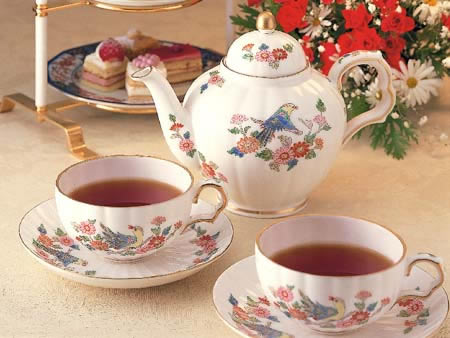 |
| The English cup of tea |
The 165 million cups of tea per day consumed by the British
has a dark side to it and I am not talking about its colour.
 This ubiquitous brew, which was known to have changed the "evil" ways of the banished herbalist ShenNong of China after some dried leaves accidentally fell
into his boiling hot water 5,000 years ago, has similarly changed the social
fabric of Great Britain in the 17th century and beyond. Tea drinking only gained
momentum when the Royal Family in 1700, namely Queen Anne, started drinking tea
with her breakfast rather than the customary beer. Alcohol in the 1700 was the
preferred liquid drunk by men, women and children, instead of the polluted
water. With no surprise the dire consequences of such wide-spread alcohol consumption
were major social dislocation in 1700 Britain. It was this nationwide adoption
of tea drinking that that saved the social fabric of the British society from further deterioration.
This ubiquitous brew, which was known to have changed the "evil" ways of the banished herbalist ShenNong of China after some dried leaves accidentally fell
into his boiling hot water 5,000 years ago, has similarly changed the social
fabric of Great Britain in the 17th century and beyond. Tea drinking only gained
momentum when the Royal Family in 1700, namely Queen Anne, started drinking tea
with her breakfast rather than the customary beer. Alcohol in the 1700 was the
preferred liquid drunk by men, women and children, instead of the polluted
water. With no surprise the dire consequences of such wide-spread alcohol consumption
were major social dislocation in 1700 Britain. It was this nationwide adoption
of tea drinking that that saved the social fabric of the British society from further deterioration. Within 100 years – the demand for tea by the British had grown to such proportions that it severely depleted the silver bullion reserves of the country. Great Britain was running short of silver bullion buying tea, tea wares “China”, silk and other highly demanded goods produced by the Middle Kingdom.
 |
| East India Company |
 |
| Slaves in the sugarcane plantations |
Queen Anne’s morning cup of tea in the late 1700s had major implications internationally affecting millions of people in a number of countries and culture. So next time someone says “want a cup of tea”, spare a thought for those involved in the darker side of tea.
No comments:
Post a Comment